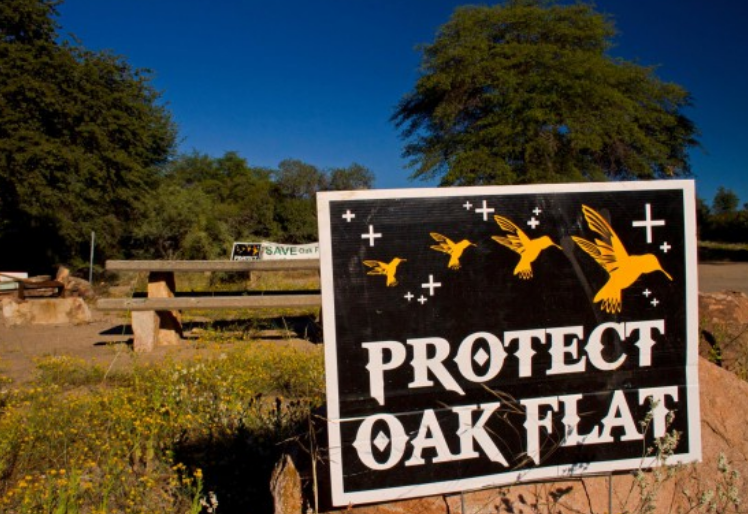
- Details
- By Native News Online Staff
WASHINGTON — A U.S district judge on Friday denied Apache Stronghold's request for an injunction to prevent the giveaway and destruction of sacred Oak Flat to Rio Tinto/Resolution Copper.
District Court Judge Steven Logan Apache Stronghold has no right to ask the Court for help because they are not an officially designated a "sovereign nation."
In his ruling, Logan said that the U.S. Government has no trust responsibility to the Apache even though their Treaty of 1852 says, "the government of the United States shall so legislate and act as to secure the permanent prosperity and happiness of said Indians."
In reaching this conclusion, the Judge quoted a case saying, "The exclusive right of the United States to extinguish Indian title has never been doubted. And whether it be done by treaty, by the sword, by purchase, by the exercise of complete dominion adverse to the right of occupancy, or otherwise, its justness is not open to inquiry in the courts."
"We are very disappointed, but we are not giving up and are excited to appeal to a higher Court and to prove our points where we disagree," Apache Stronghold leader and former San Carlos Apache Tribal Chairman Dr. Wendsler Nosie, Sr. said. "To say that we are not being coerced is not accurate as I am living there, we are praying there, yet if Rio Tinto gets Chi'chil Bildagoteel and the land becomes private property on March 11, we will be arrested for criminal trespass on our own Sacred Land."
Judge Logan also concluded that the complete destruction of Oak Flat, turning it into a two mile wide crater over a thousand feet deep, and eliminating the Apache ability to practice their religion" is not a "substantial burden" on the Apache because they are not being "coerced to act contrary to their religious beliefs by the threat of civil or criminal sanctions" even though after Oak Flat becomes private property on March 11, Apaches praying there will be subject to arrest and prosecution for criminal trespass.
"To say that we are not being coerced is not accurate as I am living there, we are praying there, yet if Rio Tinto gets Chi'chil Bildagoteel and the land becomes private property on March 11, we will be arrested for criminal trespass on our own Sacred Land,” Nosie continued.
Apache Stronghold’s lawsuit against the U.S. government claimed the giveaway and destruction of Oak Flat violates the Religious Freedom Restoration Act and Apaches’ constitutional rights to religious freedom, due process, and petition and remedy. The giveaway also constitutes a breach of trust and fiduciary duties, the lawsuit says.
In December 2014, after being thwarted for nearly a decade, Arizona Republican Sen. John McCain, along with U.S. Reps. Ann Kirkpatrick (D-Ariz.) and Paul Gosar (R-Ariz.), attached a legislative rider to the 2015 Defense Department funding bill giving away Oak Flat to Resolution Copper.
Oak Flat is located about 70 miles east of Phoenix on the Tonto National Forest on lands historically shared by multiple tribes including the Apache, the Yavapai, the Pee-Posh and the O'odham. Prior to the rider, Oak Flat has been protected from mining since 1955, when President Eisenhower protected the area for its cultural and environmental value. Rio Tinto admits that their Oak Flat mining will create a crater almost two miles across and more than 1,000 feet deep.
More Stories Like This
Native News Weekly (August 25, 2024): D.C. BriefsColusa Indian Energy Participates in Port of Quincy Town Hall on Columbia Basin Power Project
Q&A: Jingle Dress Dancer Answered Call to Ceremony in Face of ICE Violence
Haaland Gets First Hand Look at Efforts to Address Homelessness in Albuquerque
Navajo Nation Secures $285 Million in Federal Broadband Funding to Connect Thousands of Homes
Help us defend tribal sovereignty.
At Native News Online, our mission is rooted in telling the stories that strengthen sovereignty and uplift Indigenous voices — not just at year’s end, but every single day.
Because of your generosity last year, we were able to keep our reporters on the ground in tribal communities, at national gatherings and in the halls of Congress — covering the issues that matter most to Indian Country: sovereignty, culture, education, health and economic opportunity.
That support sustained us through a tough year in 2025. Now, as we look to the year ahead, we need your help right now to ensure warrior journalism remains strong — reporting that defends tribal sovereignty, amplifies Native truth, and holds power accountable.
 The stakes couldn't be higher. Your support keeps Native voices heard, Native stories told and Native sovereignty defended.
The stakes couldn't be higher. Your support keeps Native voices heard, Native stories told and Native sovereignty defended.
Stand with Warrior Journalism today.
Levi Rickert (Potawatomi), Editor & Publisher

